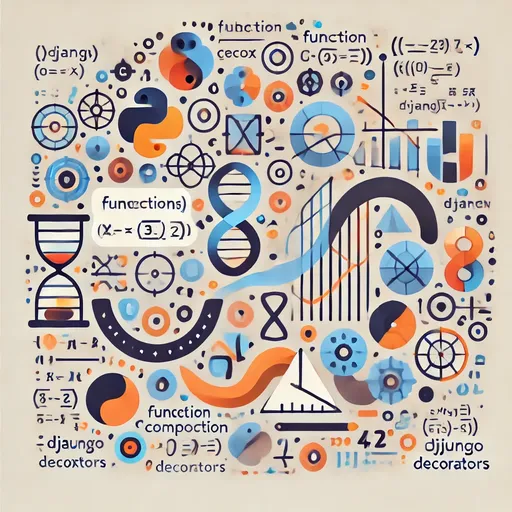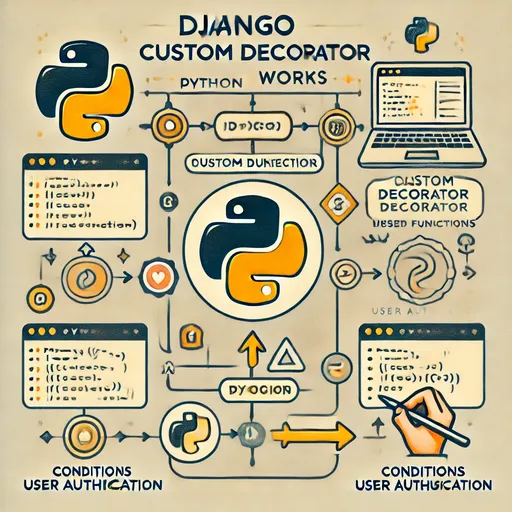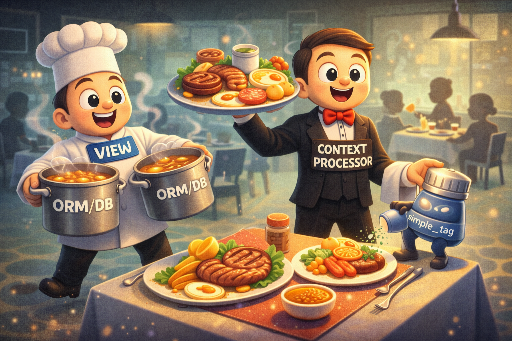Django Decorators Inspired by Mathematics: The Beauty of Function Composition and Function Spaces
Recently, while studying Django's decorators, I discovered that this concept is closely related to function composition and functional spaces in mathematics. This realization made me understand that decorators are not just programming techniques but elegant tools inspired by deep mathematical ideas. In this post, I will explore how decorators work in conjunction with their mathematical background and reflect on how mathematics practically influences our lives and programming.
Django Decorators and Mathematical Function Composition
Decorators are fundamentally higher-order functions. This means they are functions that take another function as input and return a new function. This concept is very similar to function composition in mathematics.
What is Function Composition?
In mathematics, composing two functions f(x) and g(x) yields a new function h(x) = g(f(x)) .
- f(x) : The original function
- g(x) : The function that performs transformations or additional actions
- h(x) = g(f(x)) : The result of composing the two functions
If we compare this to Django decorators, it looks like this:
The Relationship Between Decorators and Function Composition
Decorators apply g(x) to f(x) to create a new h(x) . For example, let's look at the following decorator code:
def my_decorator(func):
def wrapper(*args, **kwargs):
print("Decorator in action...")
result = func(*args, **kwargs)
print("Decorator action complete")
return result
return wrapper
@my_decorator
def say_hello():
print("Hello!")
say_hello()
Here’s the output:
Decorator in action...
Hello!
Decorator action complete
Expressed mathematically:
- Original function: f(x) = "Hello!"
- Decorator D(f) : g(x) = "Decorator in action..." + f(x) + "Decorator action complete"
- Resulting function h(x) : The final function with the decorator applied

Functional Spaces and Django Decorators
In mathematics, there is a field called functional space, which studies functions themselves. Here, functions are treated not merely as tools connecting inputs and outputs but rather as objects that can create or transform other functions. This concept is inherently present in Django's decorators.
Decorators as Function Transformations
Mathematically, we can think of decorators as transformation operators. They play the role of converting the original function f(x) into a new function g(x) .
For example:
- Original function: f(x) = x^2
- Decorator T(f(x)) : A transformation that adds 1 to the input
- Resulting function: T(f(x)) = (x+1)^2
In programming code, this can be represented as:
def add_one_decorator(func):
def wrapper(x):
return func(x + 1)
return wrapper
@add_one_decorator
def square(x):
return x ** 2
print(square(2)) # Result: 9
Mathematics and Programming: Why Do We Learn Math?
While preparing this post, I realized how mathematics impacts programming and our lives. Mathematical concepts may initially appear abstract and detached from reality, but their potential applications are limitless. There are countless examples, like Django decorators, where mathematical principles are applied.
Through the elegance of decorators in programming, we can recognize that mathematics is not merely a tool for solving problems but rather a key that opens up new possibilities. Students may wonder why they need to learn math in school, but these ideas show how essential mathematics becomes in enhancing our lives and laying the foundation for future technologies.
Conclusion: My Thoughts and Wishes
While studying Django decorators, the concepts of function composition and functional spaces emerged in my mind. Initially thought to be just a simple programming technique, I felt the mathematical ideas embedded within are incredibly beautiful and elegant. And in that moment, I realized something.
As a child, I often questioned, "Why do I need to learn math?" And I believe many students still think this way. However, when we sense how mathematical ideas infiltrate our daily lives and evolve into technologies like programming, making our lives more convenient and enriching, we come to understand the importance of that math as a vital foundation.
I hope this realization resonates with the next generation of young friends. Mathematics is not just a tool for exams, but an important key to making the world a better place. I, too, am still in the process of learning and wish to discover more such realizations.
If this post can provide even a small inspiration to someone, that will be meaningful enough. Let us all learn, think, and grow from our respective places and work together to create a better world.





There are no comments.